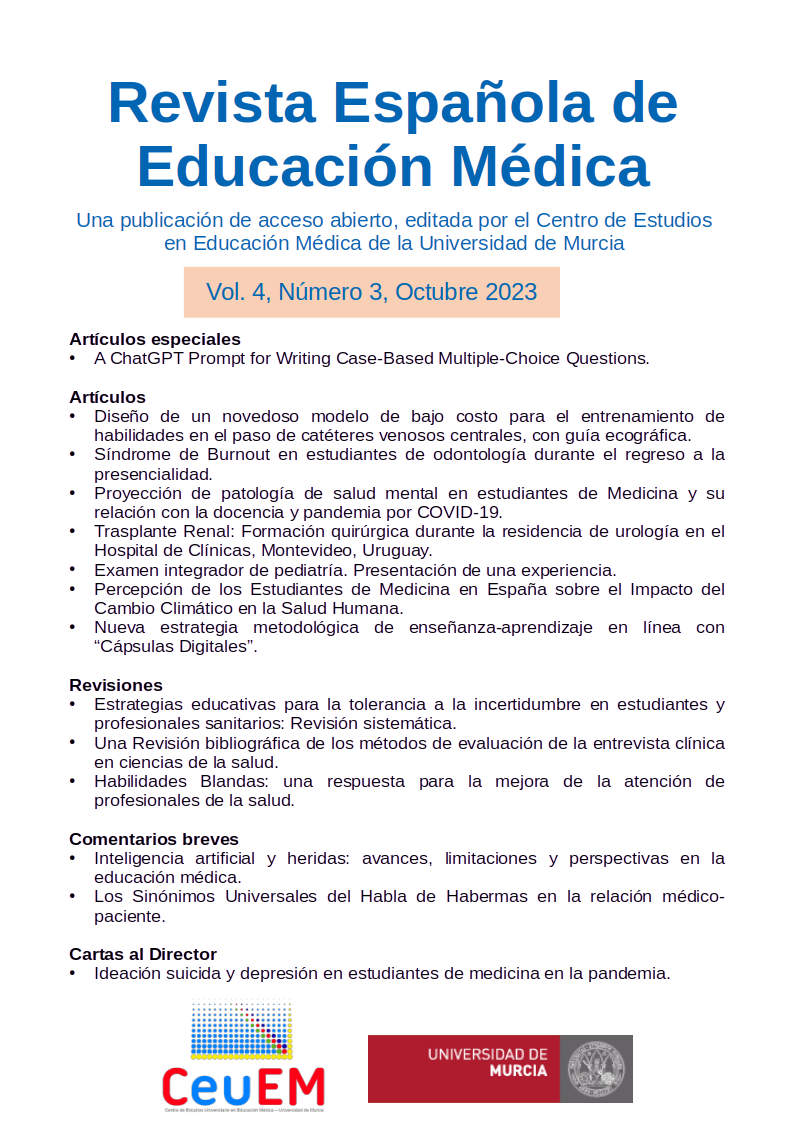Soft Skills: a response to improve the care of health professionals
Abstract
The prevalence of chronic diseases such as diabetes and obesity is increasing in Yucatán, México. One of the main factors is the low adherence rate to treatment, which demands that healthcare professionals be highly trained to face this challenge. The requirements in the training of healthcare personnel, the development of soft skills or interpersonal skills stands out as a key characteristic. These skills are not estimated in formal education but are acquired through experience. However, they can be taught and will enable professionals to provide comprehensive, patient-centered care. Soft skills such as empathy, effective communication and collaborative work will enable healthcare professionals to identify areas of opportunity where they can intervene to improve the patient's health.
Downloads
-
Abstract3691
-
pdf (Español (España))6669
-
pdf6669
References
Organización Mundial de la Salud. Informe sobre la situación mundial de las enfermedades no transmisi-bles. Ginebra: OMS 2022. http://www.who.int/nmh/publications/ncd-status-report-2014/es/
Dilla, T., Valladarea, A., Lizán, L. y Sacristán, J. Adherencia y persistencia terapéutica: causas, consecuencias y estrategias de mejora. Elsevier, 2009, 41 (6): 342-348. https://doi.org/10.1016/j.aprin.2008.09.031
Organización Mundial de la Salud. Resumen del 2016: repaso de la salud mundial de la OMS. https://www.who.int/es/news-room/feature-stories/detail/2016-year-in-review-key-health-issues
Molinari, L. R. Las habilidades socioemocionales en docentes en un colegio privado de la ciudad de Quito. Tesis, 2017. Quito: Universidad de las Américas. http://dspace.udla.edu.ec/handle/33000/8154
Buxarrais, M. Nuevos valores para una nueva sociedad. Edetania: estudios y propuestas socioeducativas. 2013, 43. 53-65. https://dialnet.unirioja.es/ejemplar/342477
Urbina, M. Habilidades blandas en ciencias de la salud. Revista Hispanoamericana de Ciencias de la Sa-lud. 2019. 5(4): 125–126. https://uhsalud.com/index.php/revhispano/article/view/408
Pades, A. Soft skills en los profesionales de la salud. Revista ROL Enfermería, 2021, 44 (5): 386-388. https://medes.com/publication/162036
World Health Organization. Adherence to long term therapies: evidence for action. Geneva, 2003.
Ortega, J., Sánchez, D., Rodríguez, O. y Ortega Legaspi, J. Adherencia terapéutica: un problema de atención médica. Acta médica Grupo Ángeles. 2018. 16 (3): 226-232. https://www.scielo.org.mx/scielo.php?script=sci_arttext&pid=S1870-72032018000300226
Tipismana, O. Desarrollo de competencias personales para el aprendizaje de saberes en atención primaria de la salud. Revista electrónica de Humanidades, Educación y Comunicación Social. 2011. 10 (6). https://dialnet.unirioja.es/servlet/articulo?codigo=3675562
Ducci, M. El enfoque de competencia laboral en la perspectiva internacional en: Formación basada en compe-tencia laboral. 1997. Uruguay. Cinterfor/OIT.
Cordero da Sailva, J., Pereira, C., Azevedo, D., Ferrerira, D., Lima de Carvalho, M. y Morais, R. En-señar empatía en salud: una revisión integradora. Revista Bioética, 2022, 30 (4): 715-724. http://dx.doi.or/10.1590/1983-80422022304563ES
Triana, M. La empatía en la relación enfermera-paciente. Avances en Enfermería, 2017, 35 (2): 121-122. https://doi.org/10.15446/av.enferm.v35n2.66941
World Health Organization. Framework for action on Interprofessional education and collaborative prac-tice. Geneva, 2010. Department of Human Resources for Health.
Lafaurie, M., Perdomo A., Tocora, J., González, M., Amaya, M., Barbosa, R., Castelblanco, M., Gar-zón, J., Hincapié, S., Huertas, L., Ochoa, M., Restrepo, L. y Triana, L. La humanización en salud: re-flexiones de docentes, estudiantes y personal administrativo de una facultad de odontología. Revistad, Salud Bosque, 2018. 8 (2): 97-105. https://doi.org/10.18270/rsb.v8i1.2498
Miró Bonet, M. Práctica colaborativa interprofesional en salud: conceptos clave, factores y percepcio-nes de los profesionales. Educ. Med. 2016. 17 (1): 21-24.
Copyright (c) 2023 Servicio de Publicaciones de la Universidad de Murcia

This work is licensed under a Creative Commons Attribution-NonCommercial-NoDerivatives 4.0 International License.
The works published in this magazine are subject to the following terms:
1. The Publications Service of the University of Murcia (the publisher) preserves the economic rights (copyright) of the published works and favors and allows them to be reused under the use license indicated in point 2.
2. The works are published under a Creative Commons Attribution-NonCommercial-NoDerivative 4.0 license.
3. Self-archiving conditions. Authors are allowed and encouraged to disseminate electronically the pre-print versions (version before being evaluated and sent to the journal) and / or post-print (version evaluated and accepted for publication) of their works before publication , since it favors its circulation and earlier diffusion and with it a possible increase in its citation and reach among the academic community.



















